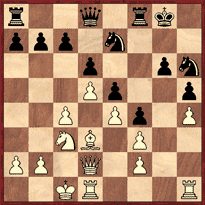
Edward Winter
C.N.s 1744 and 1814 (see pages 135-136 of Chess Explorations) discussed Alfred Kreymborg’s article ‘Chess Reclaims a Devotee’, which was reproduced on pages 6-18 of The Fireside Book of Chess by I. Chernev and F. Reinfeld (New York, 1949). It may be recalled that Kreymborg asserted that, after a painful loss to Chajes (in 1911), ‘I resolved to have done with chess tournaments, chess clubs and chess forever after’.
The article was undated, although the opening sentence began, ‘Recently, after an absence of nearly 20 years from the chess world, I returned to the game of my first love ...’ We would now add that the complete text had already been included in an earlier anthology, The Art of Chess Playing by E.V. Mitchell (New York, 1936); the acknowledgements page stated that it had originally appeared in The American Mercury (date unspecified).
John Hilbert (Amherst, NY, USA) points out that two games involving Kreymborg (a win against E.B. Adams and a loss to A.C. Cass) were published in Chess Review in 1938 (April, page 96 and June, page 133 respectively). Below is the former, together with the American magazine’s introduction.
‘One of the most interesting games of the match was won by the noted poet Alfred Kreymborg. In answer to a request by Horowitz for the game, he wrote:
“I haven’t played hard chess for 23 years. ... I’m quite certain that after White’s 21st move, a sound, though crazy-looking move, Black must lose. ... By the way, I’ve written a play called Queen’s Gambit Declined, which is dedicated to the Club. It was published by Samuel French. Maybe we’ll act it out some day. It needs only four actors, but they have to be better actors than chessplayers.”’
Alfred F. Kreymborg – Edward Bradford Adams
Manhattan Chess Club v Marshall Chess Club, New York, 12 March
1938
Nimzowitsch Defence
1 e4 Nc6 2 d4 e5 3 d5 Nce7 4 c4 d6 5 Nc3 f5 6 Bd3 g6 7 h4 h5 8 Bg5 Bh6 9 Qd2 f4 10 Nf3 Bg4 11 Bxh6 Bxf3 12 gxf3 Nxh6 13 O-O-O O-O

14 Bf1 Rf6 15 Bh3 c5 16 Be6+ Kh7 17 Rhg1 a6 18 Qd3 Qe8 19 a4 Nc6 20 dxc6 Rxe6 21 c7 Rc8 22 Nd5 Ng8 23 Rg5 Ne7 24 Rdg1 Nc6 25 b3 Qf7 26 Kb2 Nd4 27 Ka2 Rf8 28 Ka3 Qd7 29 a5 Nc6
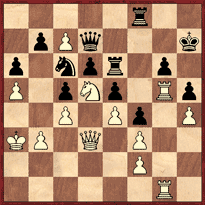
30 Qf1 Nxa5 31 Qh3 Re7 32 Qg2 Ref7 33 Rxg6 (33 Rxh5+ would have been the natural finish.) 33...Qe8 34 Rh6+ Resigns.
Readers wishing to examine databases for further play by
Kreymborg should note that, for some reason, they often spell his
name ‘Kreymbourg’.
(3484)
Kreymborg’s most famous game seems to be his loss to Capablanca (New York, 1910); see the ‘End-Game Strategy’ chapter of Chess Fundamentals. Our collection contains about 40 copies of his books (most of them inscribed by him), ranging from poetry to drama and literary criticism, but it is not altogether clear to us how high his standing as a littérateur was, is or deserves to be.
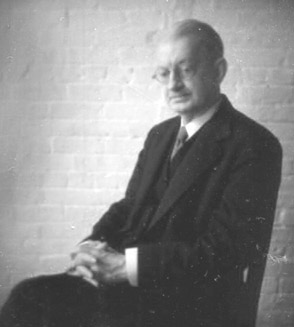
Alfred Francis Kreymborg
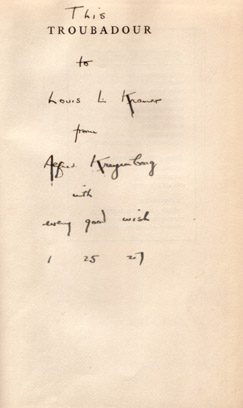
Most of his works were anthologies of verse, but no poem with a chess theme has been found. [See C.N. 5421 below.] For references to the game it is necessary to turn to his autobiography, Troubadour (New York, 1925), which presented a vivid and not always attractive picture of New York chess during his youth. Page 20 states that his own full name was Alfred Francis Kreymborg, but in the book he frequently refers to himself in the third person by his nicknames ‘Ollie’ and ‘Krimmie’.
In New York his parents, Hermann and Louisa, ran a cigar store, in which his father kept a chessboard. Pages 33-35 describe the boy’s introduction to chess:
‘At first, these moves were a mystery, a terrible puzzle, a haunting invitation. His father had refused to teach him the game. “It’s not good for you – a boy who’s always sitting by the fire – chess is bad for the health.” So Ollie had to watch and calculate, with a concentrated stare that amused the customer, especially if the customer won – which he did whenever his opponent ventured an unsound sacrifice. Immediately to defend himself with the venerable dodge: “I had a won game before I made that mistake.” The boy watched and wondered until he learned where the pieces stand before the battle begins, and was permitted to set up his father’s men – much to the amusement of the customer, who would say: “Never mind, Junge, when you grow up, you’ll be able to play – your father’s right – you’re much too young to learn now.” But Ollie was not too young – not for chess.
He had already formed a pernicious habit – a lifelong habit – of teaching himself what he could not learn otherwise. ... He was undoubtedly what people call singular. Nothing but an abnormal entity – so it might have been inferred – would have stood up night after night, on an improvised pedestal, for the purpose of learning what those rooks, knights and bishops were doing. He never asked any questions; he was too shy, too self-centred for that. But continued to study and concentrate until he had mastered every turn of the moves. Ollie was nine years old at the time.
... [H]is father ... caught him setting up the chessmen, each right piece on its right square, and trying out moves on the sly, to see if they worked. The father was so foolish as to be proud of the sight, as he lifted the boy to the throne and urged one of the customers to challenge him. “Give the boy odds – a queen and two rooks – and let’s see what will happen.” They saw him improve and promoted him from the queen and two rooks to a queen and one rook. (“What do you think of the rascal?”) And then to a queen – the queen alone. (“How did he learn so fast? – it was only a few months ago – ”) Yes, he had learned fairly fast. First of all, when he lost, he had taken to weeping hysterically – until his father gave the customer the wink, and the latter made a mistake, and Ollie won a piece and smiled, and his opponent cried, “Potztausend, what shall I do – he plays too well.” Ollie tingled all over, found the checkmate – blundered into it – and felt like the King of Spain. Night after night he sat on the improvised throne, worked with all the small faculties at his command, silently, stubbornly, until the customer had made enough calculated blunders and Ollie enough uncalculated good moves for the former to cry, “Potztausend”, the boy to smile and feel warm, his father to exclaim with delight – and his mother to call: “Come, Ollie – go to bed – it’s late – and you haven’t studied your lessons.”’
A regular visitor to the Kreymborgs was ‘old Hirschfeld’. From page 42:
‘He was popular in the family because he never played, was an expert Kibitz or onlooker and maintained an air of enthusiastic detachment, no matter what happened on the battlefield – with an almost imperceptible predilection in Ollie’s direction whenever the boy made what looked like a good move. (With regard to such moves, Frank Marshall, the present American champion, once advised Ollie to beware of patriarchs who nod with every move you make – “If they do, you can be sure you’re playing like a duffer.”) Be that as it may, old Hirschfeld nodded behind Ollie fairly constantly, and added to it by stuttering and stammering the most extravagant praise.’
On pages 70-72 Kreymborg describes how he began to regard the game more seriously and was taken to the Evans Chess Club, which was named after ‘Captain Evans who kept a guardian eye on Ollie and eventually raised a fund among the members to provide the boy with the entrance fee to his first New York state competition – at the age of 15 or 16’:
‘Way down to Eighth Street, one of his father’s customers had taken Ollie, so he might meet a few “real players”, instead of the tyros who came into the store and hampered his development. That inconspicuous den down three stone steps started a chess career lasting, on and off, for the next 15 years.
How he loved the place and haunted it. How he stole downtown on every possible occasion and through every available subterfuge. How he adored the men who idolized him so. Some of them were ages older than he; some had white heads and beards; some were even older than his father. And yet, they sat down with him without hesitation, never patronized him, but pulled out their pipes or ordered a cigar and smoked so gravely as they puzzled over Ollie’s moves, one might have fancied a master opposed them. ...
There was no appeasing his appetite for chess. If he happened to lose a game, so much the worse for his passion. It redoubled its energies, enveloped every thwarted faculty, twisted him into a frantic devotee. The mania waylaid him at night, long after he went to bed, cornered him so completely that he could repeat moves in the dark, without the board in front of him. It was thus he learned to play blindfold, as it is called. At 15 or 16, he tried playing three games simultaneously against three much weaker opponents. Each of them had a board in front of him, while Ollie, seated in another room, memorized the moves they called out. He answered the moves well enough to carry off all three games and then – fainted. This climax frightened him out of the habit.’
Next, an extract from pages 115-117:
‘There were two places to which the young author directed himself in the interests of his income: the Rice Chess Club on the East Side, almost entirely frequented by Jews, and the Manhattan Chess Club in Carnegie Hall, with a large membership of affluent business men. At both clubs, because he played on their teams in matches against other clubs, he didn’t have to pay dues. ... Affecting nonchalance, Krimmie would wait for what other professionals in similar circumstances dryly called a customer. When that gentleman arrived, and one hoped he would prove to be the bull-headed, bull-necked prosecuting attorney, James W. Osborne, who played like a perpetual beginner and always lost like a gentleman, one sat down with him, offered him the odds of a queen, rook, knight or pawn and two moves, as his case warranted, and agreed on a dime or a quarter as the friendly side bet per game. ...
For the greater part of the next ten years, these jaunts provided the most regular source of Krimmie’s income. As to the intermittent irregularities ... they were taken care of in the form of prizes he won in tournaments. These sums mounted to ten, 20 and as much as 30 dollars at a time. But as most of the tournaments lasted for months and one had to sit down once or twice a week and stick to games which dragged into six, seven and eight hours at a stretch, the contests robbed one of every available ounce of nervous energy. In the last tournament in which Krimmie participated – an American national congress running every day for two or three weeks – he lost nine pounds. “That’s nothing”, Roy Black, the Brooklyn champion, challenged him; “I’ve lost 13”. Krimmie took part in tournaments everywhere: at the Rice Club, where the prizes were smaller and one inhaled the worst tobacco smoke; at the Manhattan Club, where the prizes were larger and one enjoyed the aroma of Havana cigars; or at the gatherings of the New York State Chess Association, at one of which he tied with José Capablanca, the present world’s champion, only to lose the play-off by the most heartrending of margins, due to the smallest of slips he committed in the endgame. In addition to the tournaments, there were those team matches with rival organizations. Krimmie rarely missed such contests and acquitted himself so much better than when he fought for himself and his necessity that he forsook chess with at least the one memory of never having lost a game where his club was concerned. They gave him a nickname for that: Old Reliable One because, in his early 20s, he was already “a battle-scarred veteran”.’
Pages 124-125 include an account of the squalour and penury to be found in certain chess circles:
‘Krimmie ... walked over to the Rice Club and played far into the small hours. ... He had gone to the Rice this time, in preference to the Manhattan, because of an instinct which prompted him, whenever he felt so low he could not conceivably fall lower, to seek the society of men worse off than himself. Steeped though he was in chess as a pastime, an opiate and an income, Krimmie had detached himself sufficiently ... to see those grubbing, groping mortals distinctly outside himself. And beholding them thus – young and old Jews who would never do anything except potter over chess – the sole kingdom they conquered and ruled till the Cuban Capablanca came along – Krimmie’s self-pity vanished. He watched and listened to them all: from the brilliant young experts, Jaffe, Tenenwurzel and Bernstein, Rosen, Rosenthal and Rosenzweig, up to those patriarchs, the ironic Rabbi Berenstein, Professor Rice, the inventor of the gambit everybody busted, and the antediluvian Doctor Gold, who had composed chess problems for 60 years and would compose them until he died. And down to the swarm of “dubs and duffers” who would never get anywhere; each one a hopeless Nebich who schemed and blundered, disputed and indulged in the entire lexicon of vituperation, only to find himself in still another deadly mate-trap. Knowing their plight – how some stole off to Houston Street late at night, into a café whose proprietor allowed them to sleep there, on the chairs or on or under the tables – Krimmie forgot his own gloom. One of them, a little too proud for such charity, preferred Union Square Park and lay with the bums on the benches, until a cop came along, tapped the soles of his shoes and shouted at him to move on – as he dutifully recounted to the Morgue when the body was brought there and, a day or two later, was identified by some of the other duffers and saved from Potter’s Field.’
Finally, pages 145-146 describe how Kreymborg’s enthusiasm for chess waned:
‘Although the Rice and Manhattan clubs, for the next year or two, were still his principal haunts at night, Krimmie was soon to participate in what proved to be his last tournament. He had begun to look upon chess with aversion, not alone because, as the philosopher Mendelssohn declared, “it is too much of a game to be a science and too much of a science to be a game”, but because it was still the total source of his income ... And chess continued to take so much out of him that he dreaded, almost hated it. Despite his many friends at the clubs, he dragged his way there less frequently and degenerated into what East Siders term a Kibitz, an onlooker. After so many staunch years of it, the game had grown tediously conventional. The invariable Queen’s Gambit and Ruy López attacks and French and Sicilian defences had been so thoroughly tested and perfected by the masters and so sedulously aped by the tyros that one had to have recourse to irregular openings for the sake of a little novelty. But the Hoboken Gambit, as Krimmie dubbed his favorite irregularity – opening with the absurd advance P-QKt4 – palled on him. The move had lost its whimsicality. Even the duffers employed it and, though they floundered about among the consequences, refused to return to the much safer haven of the classics. And so, “the latest thing” rapidly joined the oldest in the breeding of an inescapable monotony.
Most of all, the ambition to rise in the demesne of Caïssa no longer appealed to Krimmie. A good part of the way from childhood, he had seen visions of himself sitting down near the head of the procession in time and, after carrying off first honors in an international tourney in Budapest or Moscow, challenging Emanuel Lasker for the undisputed championship of the world. The inglorious defeat in such an event he now resigned to others – the French, German and American champions, Janowsky, Tarrasch and Marshall – and the incredible victory to José Capablanca, the smiling enfant terrible who, at the close of the late war, dragged the conqueror of Steinitz out of retirement and overwhelmed him down in Havana. In the earlier days, as far back as his late teens, Krimmie had met Dr Lasker, but not over the board. The small, dark German-Jew, with his passion for the advancement of chess everywhere, had honored the lad by undertaking several trips to the Bronx to help him found the Bronx Chess Club. Krimmie never forgot this courtesy; nor the champion’s favorite remark: “If you see a good move, don’t make it – look for a better one.” Idling about the now dreary rooms of the Rice and Manhattan clubs, he recalled the axiom and finally applied it to the game he had followed for nearly 20 years. Chess was no longer the best move on the board; nor was it even a good one ...’
Below is a portrait of Kreymborg autographed by him in our copy of The Poetry Society of America Bulletin, November 1951, page 5:
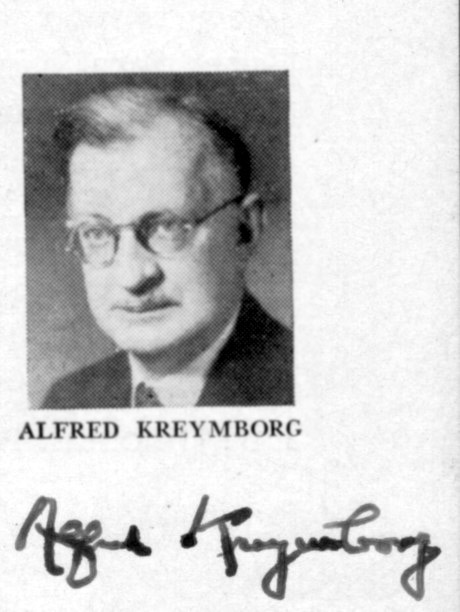
The other chess-related work by Kreymborg which is known to us (leaving aside his 1933 novel I’m No Hero, which has some chess content) is his play mentioned in C.N. 3484, Queen’s Gambit Declined. Subtitled ‘A Trio in Twilight’, it was included in the Samuel French anthology New Plays for Men & Boys (New York, 1935 and 1939). We are tentatively enquiring about being authorized to bring out a reprint, as a curio in a limited edition, although the text of a one-act play, only 14 pages long, may not arouse much interest.
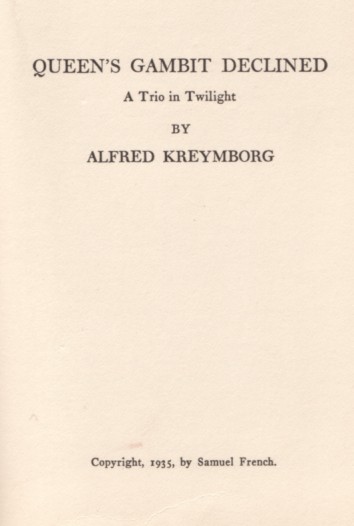
Our final word here is a reminder, and call to action, addressed
to those with responsibility or influence regarding chess
databases, so that anyone seeking games by Kreymborg is able to
find them: there has never been a chess master named ‘Kreymbourg’.
(3569)
Information is still being sought about the lesser-known chess
writings of Alfred Kreymborg. The latest specimen we have found is
his complimentary review of Edward Lasker’s The Adventure of
Chess (New York, 1950) on page 19 of the New York Times,
17 December 1950.
(4645)
Pete Tamburro (Morristown, NJ, USA) reverts to Alfred Kreymborg’s article ‘Chess Reclaims a Devotee’. He provides the exact reference for the first known publication (The American Mercury, August 1930, pages 446-453) and points out that after the paragraph naming Rosen, Rosenbaum, Rosenfeld, Rosenthal and Rosenzweig the following text is absent from the Chernev/Reinfeld book (see page 11):
‘I had done well to give up tournament chess, but nothing less than an idiotic whim had forced me to desert my old friends. I cannot attempt to describe how their welcome stirred me. The affections are outmoded these days: sentiment has been gobbled down by the sciences and by dollars mounting on dollars. One has to be hard-boiled. But hard-boiled here? Impossible. The chess world anywhere is a world unto itself, and when a gang of dark Jews welcome a goy with unrestraint, there’s nothing to do but enthuse. For nowhere else is the goy held in greater contempt. The man who dubbed chess Jewish athletics, dubbed it correctly. With rare exceptions, Jews have graced Caissa’s throne for a century past. And what, over on Second avenue, did they used to call the insignificant pawn? A goy, a little goy! But even the Gentile rises to honors in time. Look at your Jewish Who’s Who and you’ll find me there. And why not? I bragged about that once too often and was hailed by a Jew: “Dirty climber!”’
We note that the passage was included by Edwin Valentine Mitchell in his anthology The Art of Chess Playing (New York, 1936). See pages 20-21.
(5420)
Mr Tamburro also refers to a poem by Alfred Kreymborg which was published on page 4 of his book Manhattan Men (New York, 1929) and on page 194 of The Selected Poems 1912-1944 of Alfred Kreymborg (New York, 1945):
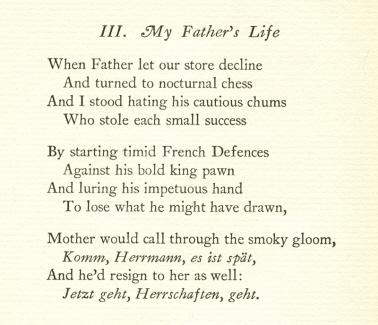
(5421)
Jim Kulbacki (Cheyenne, WY, USA) draws attention to two other chess-related poems by Kreymborg. One of them is ‘Caïssa Nods’ on page 39 of his anthology The Lost Sail (New York, 1928):
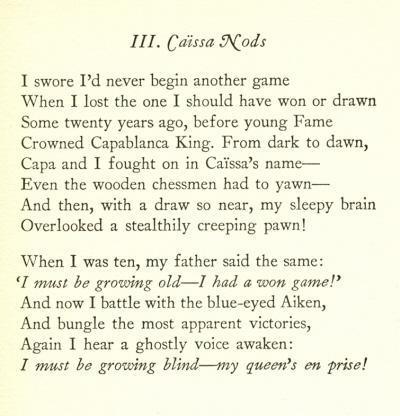
The other poem is ‘Chess Players’, on pages 120-124 of Blood of Things (New York, 1920). We find it especially intriguing for two apparently prescient references to a player named Lilienthal. Here, for example, are the last few lines of the poem:
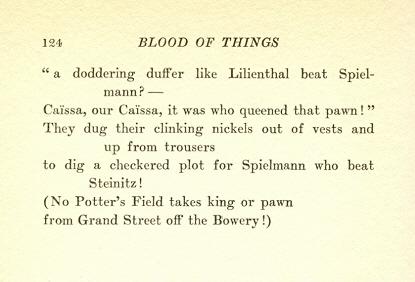
(6348)
John Blackstone (Las Vegas, NV, USA) has drawn attention to this photograph on page 9 of section three of the New York Sun, 5 February 1911:
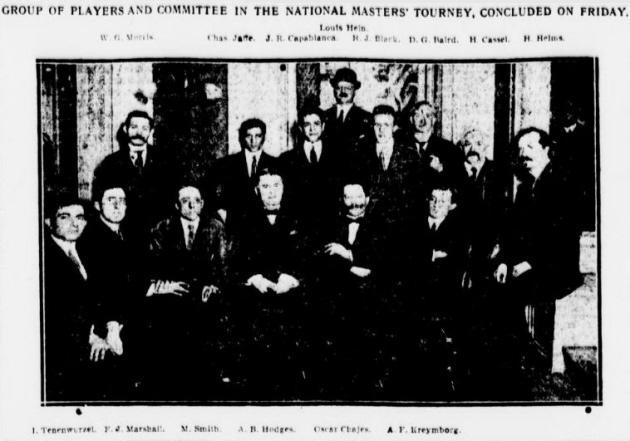
We should very much like to trace a copy of better quality.
(7871)
Kreymborg appears in a group photograph headed ‘In the Home of the Manhattan Chess Club’ on page 134 of the December 1904 American Chess Bulletin.
Concerning references to Caissa as the patron saint of chess, as opposed to the goddess, brings to mind a poem by Kreymborg, ‘Chess Players’, on pages 120-124 of Blood of Things (New York, 1920). It began:
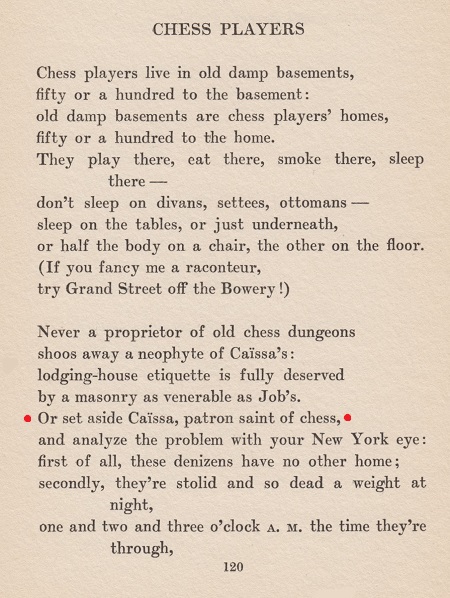
Our signed copy of the book has a small brochure with these pictures:
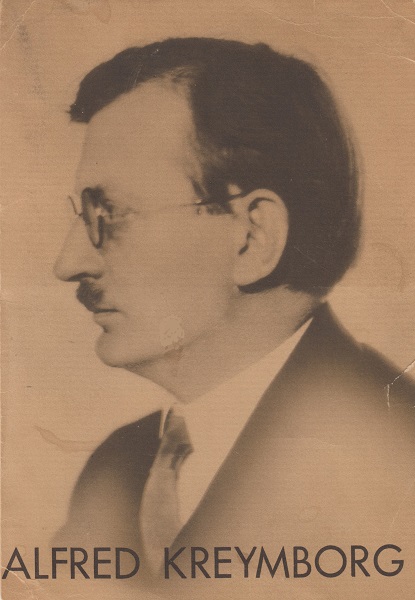
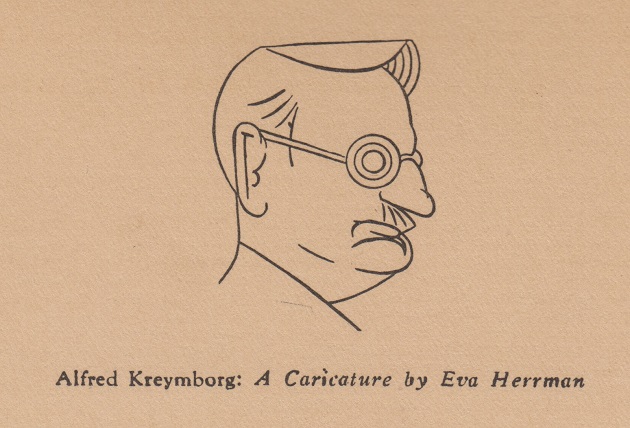
Concerning the patron saint of chess, see C.N. 2215 (page 142 of A Chess Omnibus) and C.N. 9071.
To the Chess Notes main page.
To the Archives for other feature articles.
Copyright: Edward Winter. All rights reserved.